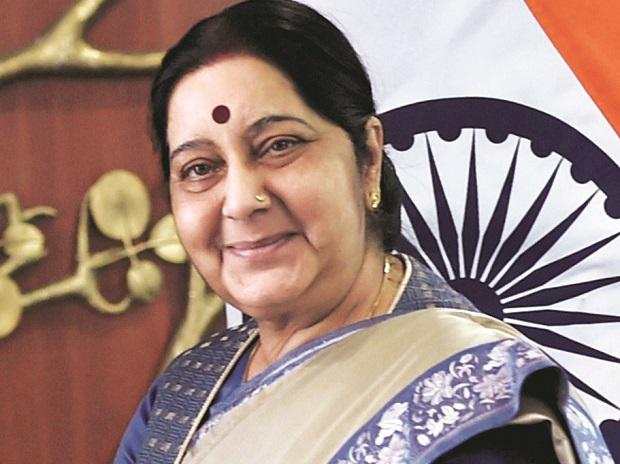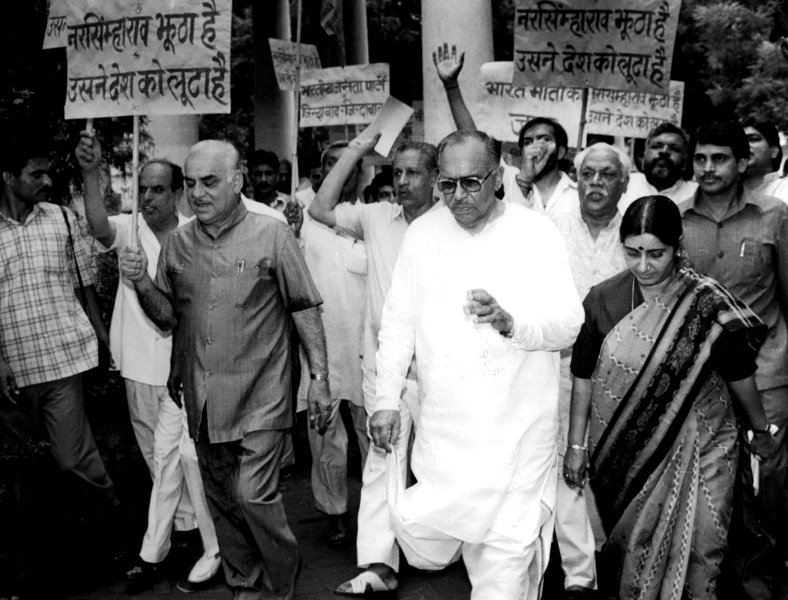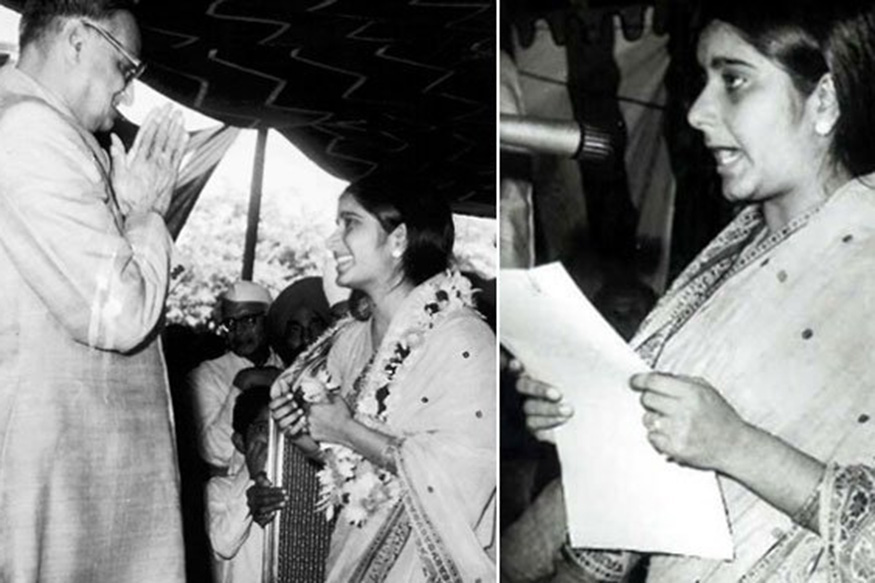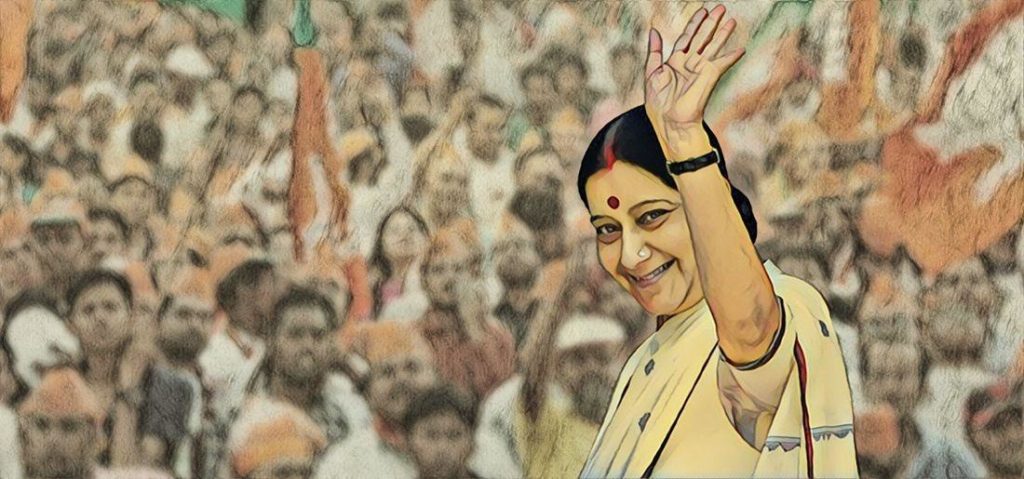The uncompromising leader; Sushma Swaraj. Read about her political journey; Birthday Special.

Sushma Swaraj; the first lady minister for External Affair in India, was said always smiling and happy, got along with people easily but she could be compromising and tough nail when pushed in the corner.
Her last tweet was expressing the joy that she had lived to see the end of Article 370 in Jammu and Kashmir.
She was just 25 when appointed as minister in the Chaudhary Devi Lal government in Haryana in 1977. Swaraj did not let her lack of experience or political stature come in the way of standing up the chief minister.
Though Devi Lal once announced he was sacking Swaraj as minister claiming she was “incompetent”, she stood her ground till Janata Party chief Chandra Shekhar read the riot act as Chief Minister. Devi Lal had to yield and ultimately he and Swaraj got along so well that she again became a minister in his government from 1987-90.
Though during her university days she was associated with Akhil Bhartiya Vidhyarthi Parishad, after her marriage to lawyer Swaraj Kaushal, she became close to socialist and joined Janata Party, which emerged in 1977 when major opposition parties submerged their identities to fight Indira Gandhi.
Later after the breakdown of Janata Party, Sushma Swaraj joined Bhartiya Janta Party. Her identification with BJP’s conservative cultural base was seen to be total, for which she had to face criticism during her tenure as the Information and Broadcasting Minister in Atal Bihari Vajpayee in 1998.
Whether anyone agreed with Swaraj or not, she stuck to her guns and refused to be bullied by critics.
1970

Although Swaraj was in association with the Sangh started at birth – she was born into a family of RSS members in Haryana in as a student leader in 1970. She was closely associated with Akhil Bhartiya Vidhyarthi Parishad (ABVP), the student wing of RSS and went onto join the Janta Party. In fact, Swaraj was an active participant in the anti-Emergency movement.
1973
She started practising as a Supreme Court lawyer after passing LLB at Panjab University.
1977

She became the country’s youngest cabinet minister at the mere age of 25 when she joined the Haryana government under Devi Lal. In the assembly elections that year, she had won the Ambala Cantonment seat with nearly64 per cent votes, double that of her closest rival. She went to serve two more terms in the legislative assembly, in 1977-82 and 1987-90.
1979

Swaraj became the Janata Party’s State President in Haryana, a position she held for four years.
1984
Swaraj joined Bhartiya Janta Party (BJP) and was eventually appointed Secretary of the party for two years. She played a key role in strengthening the BJP across the country through the 1990s.
1990
Swaraj was elected as a member of the Rajya Sabha.
1996
During the 13-day BJP government under the leadership of Atal Bihari Vajpayee, she was appointed as Ministry of Information and Broadcasting. This was seven-time MP’s second term as a member of Lok Sabha.
1998
After Atal Bihari Vajpayee led the BJPto power in 1998, she once again became the Information and Broadcasting Minister. She was also the first woman Chief Minister of Delhi, holding the position for a short period between October to December in 1998.
1999
Swaraj contested against the Congress President Sonia Gandhi in Bellary, Karnataka, in 1999 Lok Sabha Polls. Though she lost the fight, she grew in stature.
2000
She was re-elected as a Rajya Sabha member.
2003
From January 2003 to May 2004, she served as a Minister of Health and Family Welfare as well as Minister of Parliamentary Affairs.
2004
When the Congress won the 2004 Lok Sabha elections, the grand old party initially backed UPA chairperson Sonia Gandhi for Prime Ministerial Post. In a highly emotional moment, Swaraj vociferous protested against it, vowing to shave her head and live her entire life like a Hindu widow if Gandhi was sworn-in. She claimed that it would hurt her “sensibilities” if a foreigner would lead the country post Independence.
2009
Swaraj made history once again when she became the first woman Leader of Opposition, replacing her mentor Lal Krishna Advani. She held this position till 2014.
2014
Swaraj bagged the prestigious External Affairs portfolio under the Modi government. She was the second woman to take charge of this ministry after Indira Gandhi.
2018
Her Twitter follower count crossed the 11 million thresholds, making Swaraj the world’s most-followed woman leader, and of course the most followed foreign minister. In November the same year, she announced she will not be contesting the 2019 Lok Sabha elections. “I am not retiring from politics. It is just that I am not contesting the next Lok Sabha election due to my health issues,” Swaraj had tweeted at the time.
2019
She became the first Indian to address the Organisation of Islamic Cooperation (OIC) meeting as the guest of honour. This was a diplomatic victory for India, not only because it was the country’s first invite in five decades but also because it came amid high Indo-Pak tensions. Less than a week before the OIC meeting, the Indian Air Force had bombed Jaish-e-Mohammed’s Balakot camp across the Line of Control (LoC) in retaliation to the Pulwama attack.
